Malcolm R. Campbell's Blog, page 48
July 15, 2022
Thoughts while re-reading Ruta Sepetys’ ‘I Must Betray You’
If your reading speed is faster than the amount of money in your wallet, then you’ll end up re-reading many of the books on your shelves. I often re-read books by John Hart (The Hush), Kristin Hannah (The Nightingale), Pat Conroy (The Prince of Tides), and Ruta Sepetys (Salt to the Sea). I think I’ve read all of these authors’ books multiple times because they are well-written and speak to issues larger than their plots.
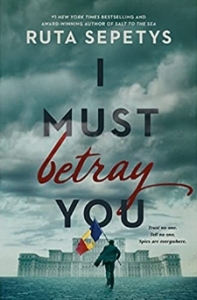 As I re-read I Must Betray You, I find myself simultaneously captured by the story it tells and horrified at the life Romanians led under the regime of Nicolae Ceaușescu who led the country until the revolution of 1989. I remember this from news reports, though I had no idea how pervasive the expectation was that “good citizens” were all expected to inform on each other.
As I re-read I Must Betray You, I find myself simultaneously captured by the story it tells and horrified at the life Romanians led under the regime of Nicolae Ceaușescu who led the country until the revolution of 1989. I remember this from news reports, though I had no idea how pervasive the expectation was that “good citizens” were all expected to inform on each other.
As a Libertarian (not a Republican using the term falsely), I think we already live under too much surveillance from highway license plate readers that track who goes where to NSA listening to conversations that are expected to be private. But, as I read I Must Betray You, I think maybe things here are either much better than my worst fears or are heading in the direction of my worst fears.
The New York Times reviewer said the novel is “A gut-wrenching, startling historical thriller about communist Romania and the citizen spy network that devastated a nation, from the #1 New York Times bestselling, award-winning author of Salt to the Sea and Between Shades of Gray.”
My thoughts are: (a) Why does a dictator “need” to deny so much freedom to his/her country’s citizens? and (b) How do so many people put up with their government’s atrocities for so long?
From The Publisher
Romania, 1989. Communist regimes are crumbling across Europe. Seventeen-year-old Cristian Florescu dreams of becoming a writer, but Romanians aren’t free to dream; they are bound by rules and force.
Amidst the tyrannical dictatorship of Nicolae Ceaușescu in a country governed by isolation and fear, Cristian is blackmailed by the secret police to become an informer. He’s left with only two choices: betray everyone and everything he loves—or use his position to creatively undermine the most notoriously evil dictator in Eastern Europe.
Cristian risks everything to unmask the truth behind the regime, give voice to fellow Romanians, and expose to the world what is happening in his country. He eagerly joins the revolution to fight for change when the time arrives. But what is the cost of freedom?
Master storyteller Ruta Sepetys is back with a historical thriller that examines the little-known history of a nation defined by silence, pain, and the unwavering conviction of the human spirit.
Of course, I know one thing Cristian Florescu doesn’t know. The dictator and his wife aren’t going to stay in power because a revolution is coming. But even if he knew, could he hold it together like a person in a storm who knows the storm will ultimately move out to sea? Yet, I appreciate his spunk, his beliefs, and the risks he’s willing to take. I think all of that goes beyond what most of us in the U.S. would be willing to do to get back to the kind of government the founders intended.
You may feel totally different things as you read this book. That’s fine. The point is, that in addition to providing us with a good story, Sepetys provides us with a lot to think about in the countries where we live.
July 14, 2022
Ken Follett’s sobering novel ‘Never’
Many authors, especially lately, have written books about the end of the world as we know it. I think the first novel I read about an apocalypse in our world was the 1949 Earth Abides by George R. Stewart. In spite of its theme, which seemed all too real to me as a junior high school student–I liked the novel a lot. Stewart’s antagonist was disease.
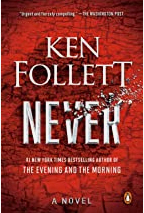 Today, I see a lot of novels in which the culprit is climate change, and that’s to be expected. Early on, I read Hiroshima (1946) by John Hersey, On the Beach (1957) by Nevil Shute, and countless nuclear war-related novels since. Those books probably influenced my belief that Truman was wrong when he dropped atomic bombs on Hiroshima and Nagasaki.
Today, I see a lot of novels in which the culprit is climate change, and that’s to be expected. Early on, I read Hiroshima (1946) by John Hersey, On the Beach (1957) by Nevil Shute, and countless nuclear war-related novels since. Those books probably influenced my belief that Truman was wrong when he dropped atomic bombs on Hiroshima and Nagasaki.
To avoid getting into the realm of spoilers here, I’m not doing to tell you how Never ends. Yes, it does involve the prospect of nuclear war. People seem to be of two minds about how a nuclear war might start. Primarily, people presume Russia or China will suddenly attack the United States or whatever rationale brings either country to that point. Others presume the war would be started by a rogue nation like Iran or North Korea that has nothing to lose by harming the United States and other western nations.
What’s sobering about Follett’s novel is how small and/or isolated provocations, many of which involve a so-called “appropriate response” can escalate into a potential conflict that might involve nuclear weapons. In this scenario, it doesn’t take long for countries that have responded to attacks with conventional weapons to respond with a measured conventional weapons response to suddenly be on the brink of a war much larger and more difficult to stop.
This well-written, realistic novel provides readers with a lot of food for thought. It’s one of those books that’s very hard to stop reading even though there are chores to be done and bedtime to consider. I hope some of those who read it will be impacted as I was impacted by Hiroshima and On The Beach and resolve that there’s never a justifiable reason for using a nuclear weapon.
July 12, 2022
What do you do when you’re not writing?
Once an author begins a new novel or short story, there’s no such thing as “not writing” even when s/he isn’t actually writing. The characters are always present. The need to gather more information is equally present. It’s hard to explain this to people who see me reading online or a paper book (yes, they still exist) and assume I’m taking a break. Nope, doesn’t happen.
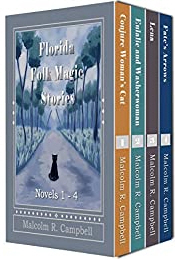 My novel in progress is called Pollyanna Hoskins. If you read Thomas-Jacob Publishing’s free anthology, then you saw the first chapter of this novel in my “Smokey Hollow Blues” short story. Before I wrote that short story, I’d been trying to write another novel set in Glacier Park. But, I couldn’t do it. My novels set in the park (there are three of them, I think) were too far back in time for me to just plug into their matrix and start writing about the high country again.
My novel in progress is called Pollyanna Hoskins. If you read Thomas-Jacob Publishing’s free anthology, then you saw the first chapter of this novel in my “Smokey Hollow Blues” short story. Before I wrote that short story, I’d been trying to write another novel set in Glacier Park. But, I couldn’t do it. My novels set in the park (there are three of them, I think) were too far back in time for me to just plug into their matrix and start writing about the high country again.
However, I’d already written four novels in my “Florida Folk Magic Series,” so it was easier to step back into that world again. So, I’m writing about north Florida again. And a CIA operative. And the Klan. And a bit of conjure. I grew up in this world, so it’s home–for better or worse. I know it sounds weird, but the stories a writer writes choose him/her rather than the other way around.
I thought I was done writing about the Florida Panhandle. Well, I guess not. As it turns out, an author is never really done writing about anything.
July 11, 2022
FAILED BILL BROUGHT BY ARIZONA DEMOCRATS WOULD HAVE RESTRICTED WHAT TEACHERS CAN TEACH
FOR IMMEDIATE RELEASE: Pen America, July 5, 2022
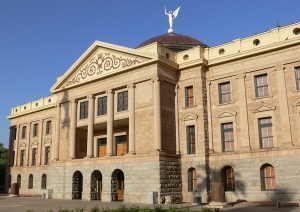 AZ Capitol Building – Wikipedia Photo
AZ Capitol Building – Wikipedia Photo
(NEW YORK)– Since Republican state legislators began proposing educational gag orders in January 2021, votes on these legislative restrictions on the freedom to read, learn, and teach have generally broken down along partisan lines.
Last week, however, 11 Democrats in the Arizona House of Representatives introduced HB 2634, an unsuccessful bill that would have banned from school curricula “any textbook or other instructional material…that contains any matter reflecting adversely on persons on the basis of race, ethnicity, sex, religion, disability, nationality, sexual orientation or gender identity.”
In response, Jeremy C. Young, senior manager of free expression and education at PEN America. said: “Government-imposed censorship of students and teachers is always the wrong approach, no matter the motivation, and no matter which side of the political aisle it comes from. Educational gag orders have no place in our schools, period.
Had HB 2634 become law, Arizona teachers might have been unable to assign materials that depict historical or literary instances of discrimination to educate students about why discrimination is wrong — such as the Supreme Court’s Plessy v. Ferguson decision or the works of Pulitzer Prizewinning author Toni Morrison. We should never seek to impose content-based restrictions on teachers through the force of law. Doing so violates the principle of free expression and impoverishes student learning in the classroom.”
July 10, 2022
Sunday’s succotash (who invented that stuff, anyway?)
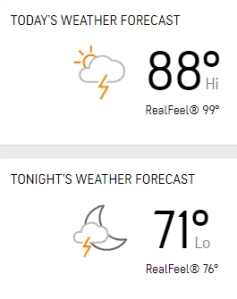 As you can see by the AccuWeather graphic, our heat wave in North Georgia has eased up a bit, leaving us with an outdoor sauna bath without anyone handing out fresh towels and cold beer. At present, my desktop weather simply says “rain off and on.” Other than not having fresh towels, we’re also not having grass dry enough to mow. The yard’s not looking its best right now. About all I’m doing outside these days is pulling the wheelie bin out to the road and going out to buy groceries (which ensures that I’ll have to keep moving garbage from the house to the road).
As you can see by the AccuWeather graphic, our heat wave in North Georgia has eased up a bit, leaving us with an outdoor sauna bath without anyone handing out fresh towels and cold beer. At present, my desktop weather simply says “rain off and on.” Other than not having fresh towels, we’re also not having grass dry enough to mow. The yard’s not looking its best right now. About all I’m doing outside these days is pulling the wheelie bin out to the road and going out to buy groceries (which ensures that I’ll have to keep moving garbage from the house to the road). I was happy to see this news: “Novelist Jesmyn Ward has become the youngest person ever to win the Library of Congress Prize for American Fiction.” Her words are well controlled and still carry magic in them. According to Michael Shaub’s story on Kirkus, Ward said, the award “not only because it aligns my work with legendary company, but because it also recognizes the difficulty and rigor of meeting America on the page, of appraising her as a lover would: clear-eyed, open-hearted, keen to empathize and connect.”
I was happy to see this news: “Novelist Jesmyn Ward has become the youngest person ever to win the Library of Congress Prize for American Fiction.” Her words are well controlled and still carry magic in them. According to Michael Shaub’s story on Kirkus, Ward said, the award “not only because it aligns my work with legendary company, but because it also recognizes the difficulty and rigor of meeting America on the page, of appraising her as a lover would: clear-eyed, open-hearted, keen to empathize and connect.”
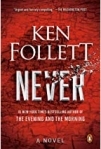 Currently, my light reading has taken me to Ken Follett’s Never (2021). I must confess I hadn’t read anything from him since The Pillars of the Earth. His work still reads well, though it tends to be long and (in Never, at least) includes multiple venues that take a while to get used to. If we can trust Steven King, and I think we can (more or less), he said, “Ken Follett can’t write a bad book, and Never is his best. It’s terrifying. I defy anyone to put it down once the last 150 pages are reached.”
Currently, my light reading has taken me to Ken Follett’s Never (2021). I must confess I hadn’t read anything from him since The Pillars of the Earth. His work still reads well, though it tends to be long and (in Never, at least) includes multiple venues that take a while to get used to. If we can trust Steven King, and I think we can (more or less), he said, “Ken Follett can’t write a bad book, and Never is his best. It’s terrifying. I defy anyone to put it down once the last 150 pages are reached.” We’ve been watching old movies at night because most of our “regular shows” have taken their usual long summer vacation. How long has it been since saw you Sydney Pollack’s neo-noir “Absence of Malice” from way back in 1981? Since my wife and I started out as journalists, it was fun seeing an old-style functioning newsroom. As Wikipedia notes, Variety called it “a splendidly disturbing look at the power of sloppy reporting to inflict harm on the innocent.” I always liked Melinda Dillon, Wilford Brimley, and then, Paul Newman wasn’t bad either. I kept expecting Sally Field to show up looking like the flying nun or Forrest Gump’s mom in which she’d explain the whole box of chocolates thing to Paul Newman.
We’ve been watching old movies at night because most of our “regular shows” have taken their usual long summer vacation. How long has it been since saw you Sydney Pollack’s neo-noir “Absence of Malice” from way back in 1981? Since my wife and I started out as journalists, it was fun seeing an old-style functioning newsroom. As Wikipedia notes, Variety called it “a splendidly disturbing look at the power of sloppy reporting to inflict harm on the innocent.” I always liked Melinda Dillon, Wilford Brimley, and then, Paul Newman wasn’t bad either. I kept expecting Sally Field to show up looking like the flying nun or Forrest Gump’s mom in which she’d explain the whole box of chocolates thing to Paul Newman. On a completely irrelevant side note, our local Food Lion grocery store has finally started carrying Newman’s Own salad dressings and other products. The product shown here not only tastes great on a tossed salad but also works as a great marinade for steak. According to the company’s website, “When Newman’s Own first began, Paul Newman declared that 100% of the profits would go to good causes. The mission continues today through Newman’s Own Foundation. In total, more than $570 million has been donated to good causes since 1982.” By the way, Newman wasn’t wearing that crown in the movie.
On a completely irrelevant side note, our local Food Lion grocery store has finally started carrying Newman’s Own salad dressings and other products. The product shown here not only tastes great on a tossed salad but also works as a great marinade for steak. According to the company’s website, “When Newman’s Own first began, Paul Newman declared that 100% of the profits would go to good causes. The mission continues today through Newman’s Own Foundation. In total, more than $570 million has been donated to good causes since 1982.” By the way, Newman wasn’t wearing that crown in the movie.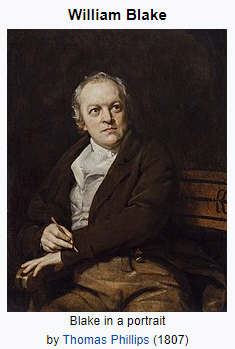 Those of you who know me, whether you’ll admit it or not, know that I’m a fan of poet/engraver William Blake (1757-1827). So I was happy to see a story about him in The Marginalian, “The Only Valiant Way to Complain Is to Create: William Blake and the Stubborn Courage of the Unexampled.” It begins on a disturbing note: “In the first days of a bleak London December in 1827, a small group of mourners gathered on a hill in the fields just north of the city limits at Bunhill Fields, named for “bone hill,” longtime burial ground for the disgraceful dead. There, in what was now a dissenters’ cemetery, the English Poor Laws had ensured a pauper’s funeral for the man who had died five days earlier in his squalid home and was now being lowered into an unmarked grave.” He saw what others seldom see and probably don’t understand–especially in 1827. The story notes that Blake was the man Patti Smith would celebrate as “the loom’s loom, spinning the fiber of revelation” — a guiding sun in the human cosmos of creativity.
Those of you who know me, whether you’ll admit it or not, know that I’m a fan of poet/engraver William Blake (1757-1827). So I was happy to see a story about him in The Marginalian, “The Only Valiant Way to Complain Is to Create: William Blake and the Stubborn Courage of the Unexampled.” It begins on a disturbing note: “In the first days of a bleak London December in 1827, a small group of mourners gathered on a hill in the fields just north of the city limits at Bunhill Fields, named for “bone hill,” longtime burial ground for the disgraceful dead. There, in what was now a dissenters’ cemetery, the English Poor Laws had ensured a pauper’s funeral for the man who had died five days earlier in his squalid home and was now being lowered into an unmarked grave.” He saw what others seldom see and probably don’t understand–especially in 1827. The story notes that Blake was the man Patti Smith would celebrate as “the loom’s loom, spinning the fiber of revelation” — a guiding sun in the human cosmos of creativity.

So, I ask you, where else can you read about Sally Field, salad dressing, and William Blake in the same post?
July 9, 2022
Knights Templar in Illinois
In my footnote to yesterday’s post about the Knights Templar, I mentioned that my grandfather was a commander in the Illinois Commandery of the Knights Templar in the United States. Since he was the boss, he could take us on tours of this building, including the basement where the pool tables were. (My two brothers and I could never beat Grandpa had pool or billiards.)

As an elementary student and a junior high school student, I was too young to understand the heritage of the organization or the goals of its current incarnation. The Knights Templar is a York Rite organization and, while it’s associated with the Freemasons now, it seems doubtful that there’s any provable direct link between the ancient Knights Templar and the modern-day Masons.
I joined DeMolay, associated with the Masons, while I was in junior high, and then had to drop out when its meetings conflicted with my Boy Scout activities to which I already had committed.
When my grandfather moved to Florida, he was disappointed in the Masonic organization there. I suspect they were a craft lodge, a level he would have already passed through and, therefore, quite different than what he was used to in Illinois.
My first crisis of conscience came when I left DeMolay for the Boy Scouts (which Grandfather approved of, reminding me I was already on that track). My second came when I was older and joined the Rosicrucian Order (a mystery school) rather than the Masons. I didn’t have time for both, and the “mysteries” seemed to be where I belonged.
Even now, I wonder. Would my life be different if I was a “Sir Knight” of the Knights Templar? I’m sure it would be. And yet, I have no excuses for the journey I chose. There are many routes leading to becoming oneself. And as Frost said, “I took the one less traveled by, And that has made all the difference.”
My novels usually focus on the transformation of the main character. That’s my main focus because I have been there over and over–as have we all.
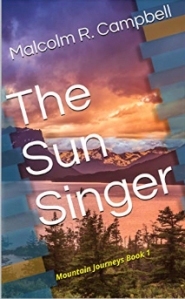 Malcolm R. Campbell is the author of “The Sun Singer,” a hero’s journey novel.
Malcolm R. Campbell is the author of “The Sun Singer,” a hero’s journey novel.
July 8, 2022
The ubiquitous fascination of the Knights Templar
“As late as the medieval era and beyond, social groups claiming to hold secret wisdom– such as the Gnostics, the Cathars or the Knights Templar, sought to establish their pedigree by linking themselves explicitly to the deep wisdom held by the ancient mystery religions; and scholars have demonstrated, in fact, that such linkages do exist.
“Fast forward to modern times. With the Enlightenment, a more secular, scientific, and overtly political outlook permeated Western society, and these elements were reflected in the secret societies that arose at the time, such as the Freemasons and the Carbonari.” – Paul Witcover
In the years after the crusaders captured Jerusalem in 1099 many Christians wanted to visit sites in the Holy Land free from interference by robbers and others in Muslim-controlled areas. Out of this need grew the Knights Templar, an organization of religious knights that ultimately became so large and wealthy, that its existence and prospective control of holy artifacts became a huge threat to Rome by the 1300s.
From time to time somebody writes a new novel or nonfiction book and the Knights appear on the bestseller lists and our fascination with the power and magic and treasure they might have controlled is reborn. Public interest was especially strong when Dan Brown’s The Da Vinci Code was released in 2006. Currently, there is speculation amongst the treasure hunters on the History Channel’s “The Curse of Oak Island” series that the Canadian island might contain the lost treasure of the Templars.
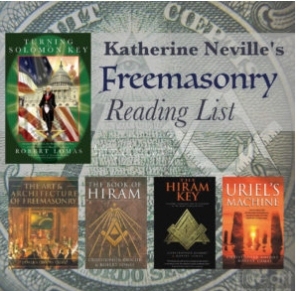 A lot of people tend to see the Templars, the Freemasons, the Illuminati, the Rosicrucians, and other mystery-school-styled groups (If they exist at all) as wholly evil and secretly in control of the world or as groups interested in the mystical side of the Christian religion and its predecessors. So much fiction (some with a lot of farfetched straying from the facts) and nonfiction about these organizations has been written that it’s often hard to sort out the real from the absurd. The “mysteries” refer to the Eleusinian Mysteries, the Dionysian Mysteries, and the Orphic Mysteries.
A lot of people tend to see the Templars, the Freemasons, the Illuminati, the Rosicrucians, and other mystery-school-styled groups (If they exist at all) as wholly evil and secretly in control of the world or as groups interested in the mystical side of the Christian religion and its predecessors. So much fiction (some with a lot of farfetched straying from the facts) and nonfiction about these organizations has been written that it’s often hard to sort out the real from the absurd. The “mysteries” refer to the Eleusinian Mysteries, the Dionysian Mysteries, and the Orphic Mysteries.
The author Katherine Neville, who was writing Dan-Brown-style novels before Dan Brown was writing them has a nice list of secret society references on her website that help separate the wheat from the chaff when it comes to the Templars, the Masons, and other groups. If you’re trying to find a starting point in Templar lore–after exhausting Wikipedia–may I suggest her list of references?
I’ve read many of the books on the list and yes, they are fascinating.
—Malcolm
July 7, 2022
Excerpt: ‘Haints in the Woods’
SO, MY CONJURE woman was fit to be tied.
“Sweet kitty, I’ve been married four hours and my groom’s done run off. Lena, I don’t reckon Willie needs all afternoon to fetch a quart of Borden’s Milk for flapjacks from the Mercantile. By now, he’s met a dark dusty butt down in Estiffanulga for a few hours of jelly and juice.”
She spat a long stream of tobacco juice into the dead cookfire’s frying pan with no flapjacks in it to emphasize her point of view. Then she went back to sipping her homemade moonshine and singing Sister Rosetta Tharpe songs. Folks always said her voice was just as pure now as it was a half-century ago when she sang at the jook.
Nobody pays much attention to a black cat’s opinion, but to my way of thinking, lonesome has its limits. Like a broken record, Eulalie got stuck on “The Lonesome Road,” belting it out as truly mournful as she could over and over, lingering long on the word “weary.”
 Praise the good Lord, as the deacon would say, for Pollyanna chose that moment to drive her grey Ford truck through the busted section of the wrought iron fence into the backyard. She wore her favorite green capri pants, black blouse, black sling-back sandals, and a wide smile that showed off her new black lipstick and matching nail polish.
Praise the good Lord, as the deacon would say, for Pollyanna chose that moment to drive her grey Ford truck through the busted section of the wrought iron fence into the backyard. She wore her favorite green capri pants, black blouse, black sling-back sandals, and a wide smile that showed off her new black lipstick and matching nail polish.
“Young people,” whispered Eulalie.
Pollyanna came up to the porch with an Alligator Supreme orange crate chuck full of who knows what covered over in butcher paper.
“Did you see a soused sinner riding his hinny back home?” asked Eulalie.
“Why, is one missing?”
“I was just telling Lena that I think Willie’s sharing jelly and juice with some dusty butt miles away from where he’s supposed to be.”
Pollyanna set down the orange crate. “I don’t even know what that means.”
“Sex and booze with a ho,” Eulalie said.
“Holy shit.”
Pollyanna slumped down into the sagging couch with a fading smile. When Eulalie handed her the Mason jar of shine, she wasn’t shy about drinking her fill.
“I ain’t really po’ moufin’ my brand-new husband,” said Eulalie. “I’m hopin’ he is a soused sinner today.”
“I know I’m repeating myself, but holy shit.”
“Beats bein’ among the dead. I threw the bones an hour ago, and they said he’s with the dead.
Then Lena went lookin’ for him on a spirit journey, and she saw nothin’ but ace-of-spades blackness. As you white folks sometimes say, we’re on tenterhooks.”
“I can drive to the Mercantile and ask Lane if Willie’s been there,” said Pollyanna.
Eulalie smiled. “Thanks for offerin’, but we already know he came and went there and that he ain’t jawbonin’ with Lane, Rudy, or Jessamyn. Best thing you can do now is distract me with whatever you got hid in that crate.”
“I drove over to Sears Roebuck in Tallahassee and got you what I would have got you if you’d taken time for a bridal shower.”
“Kid stuff, those showers.”
Pollyanna pulled aside the butcher paper and fetched out a pale green nightgown like a magician pulling a rabbit out of a hat.
Eulalie looked like she’d seen a ghost.
“Chile, Willie can ’bout see through that.”
Pollyanna leaned into Eulalie so they were eye to eye. “That’s the point, ain’t it?”
“If I put this on, I’m either turnin’ the lights out or he’s wearin’ a grocery sack over his head.”
She looked at the tag and actually giggled loud enough to embarrass even me because she was acting young enough for a bridal shower. “Charmode Aravel with Rayon: this ain’t no fancied-up flour sack.”
“Next,” said Pollyanna, “we have a tube of Cashmere Bouquet red lipstick.”
Eulalie puckered up her mouth like she was sucking on lemons and sipped on her moonshine before she said anything.
“I ain’t painted up my face since I sang the blues at the jook. I always wore red and kept my hair unruly because the hotter I looked the bluer the blues painted up the walls and the hearts of the men who were half-listenin’ while they drank cheap beer and played dangerous cards.”
“I bet you were one classy chassis,” said Pollyanna.
“Thank you. Here, take a sip.”
Eulalie opened the tube of lipstick and made a mark on the back of her hand. “It still don’t clash with dark brown sugar. Even so, lips like cherries might scare the hell out of Willie, assumin’ that no-good man ever gets hisself back home.”
“I have an idea,” said Pollyanna.
“What’s that?”
“Grab another swig first and promise not to hit me.”
“I promise. You know, this is my best batch of shine in ages. Okay, I’m ready.”
“Rather than painting your mouth. Draw an arrow on your tummy pointing downward so Willie will know where to go if he gets lost.”
–
You can read the rest of this short story, my story “The Smokey Hollow Blues,” and the work of my colleagues at Thomas-Jacob Publishing for free in The Things We Write Anthology by clicking on the cover graphic above.
July 6, 2022
A few things
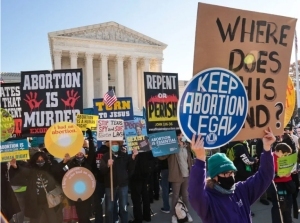 Those of you who’ve read this blog for a while, know that I think the Supreme Court made a horrid decision in overturning Roe v Wade and further that that decision was fueled by party politics and religious beliefs rather than a serious and objective analysis of the laws and Constitution.
Those of you who’ve read this blog for a while, know that I think the Supreme Court made a horrid decision in overturning Roe v Wade and further that that decision was fueled by party politics and religious beliefs rather than a serious and objective analysis of the laws and Constitution.
This decision will unleash a firestorm of tyranny tantamount to the subjugation of women to the point that they will become second-class citizens in more ways than they already are. If the Justices had considered the entire scope of problems that can and will stem from their decision, they could have easily modified Roe within the scope of women’s liberty rights and equality rights and in a way that would block the following:
Contraception methods that can be construed as harming a real or imagined fetus will be banned, including the morning-after pill, if the law states that life begins at conception even though science cannot pinpoint when that moment is until long after the fact.Pregnancies will be registered and tracked to ensure that if they aren’t carried full term to a viable birth, women will face prosecution for miscarriages, or activities that could have harmed the fetus.Doctors will be supplied with a list of medications and procedures that might remotely jeopardize a fetus and will be admonished under the threat of sanctions to withhold these from pregnant or potentially pregnant women.The birth rate will go down as more and more women balk at the government oversite into their lives and medical care.Suicides and illegal abortions will rise when women have no alternative, due to the law, to carrying pregnancies caused by rape and incest to term and further allowing, by law, the rapists’ parental rights.Freedom of speech will be curtailed on subjects related to the above because those speaking out will be considered to be advocating ways around these draconian results.Needless to say, the poor will suffer the greatest injustice because they will not be able to afford to travel to alternative jurisdictions, especially if pregnant women are prohibited from traveling either because such travel might harm a fetus and/or end up in a state allowing abortions.Some of these things have already happened.
–Malcolm
P.S. This will be my last post about this subject because people whom I love and respect are on the other side of the debate. I cannot in good conscience oppose them in public forums.
July 5, 2022
I’m pleased when a Google book search leads me to an independent bookstore
When I’m doing online research and see a footnote for a relevant book, I tend to first search for that title on Google because I’m lazy. It takes fewer keystrokes to do that than to go to Amazon or B&N and search for the title there. I often find the book at an independent bookstore that provides online ordering.
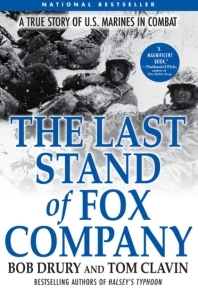 Yesterday, I was looking for this book because I refer to the battle multiple times in my novel in progress. General McArthur, wanting the glory of saying his troops pissed in and/or drank out of the Yalu River between North Korea and China, sent his troops north, ignoring the intel that his marines were marching into a trap near the Chosin Reservoir.
Yesterday, I was looking for this book because I refer to the battle multiple times in my novel in progress. General McArthur, wanting the glory of saying his troops pissed in and/or drank out of the Yalu River between North Korea and China, sent his troops north, ignoring the intel that his marines were marching into a trap near the Chosin Reservoir.
His marines were badly outnumbered, especially Fox Company which was guarding a strategic pass. The battle of Fox company is one of the most heroic in marine corps history in a war most of us have forgotten.
So a Google search on the title leads me to a copy available at the Whistlestop Bookshop an independent bookseller in Carlisle, Pennsylvania. With a few keystrokes, I ordered the book, pleased to be buying it from somebody other than Amazon. Good, I had the book on order without buying it from that near-monopoly that offers everything from A to Z.
Looking at the ABOUT US page, I know that if I lived in Carlisle. I would go to that store:
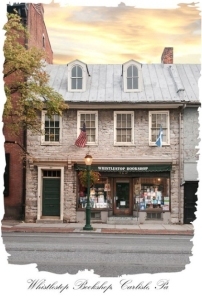 Whistlestop Bookshop opened in Gettysburg in August 1985 at 11 West Railroad St, right across from the Lincoln Diner. A quick two-and-a-half years later, in January 1988, we opened a second store in Carlisle at 152 West High Street, next door to Back Door Cafe and the Bosler Memorial Library.
Whistlestop Bookshop opened in Gettysburg in August 1985 at 11 West Railroad St, right across from the Lincoln Diner. A quick two-and-a-half years later, in January 1988, we opened a second store in Carlisle at 152 West High Street, next door to Back Door Cafe and the Bosler Memorial Library.
Eventually, both stores moved to larger quarters. Whistlestop Gettysburg moved to 104 Carlisle Street. We closed it at the end of July 2004, after 19 years.
But, I don’t live there. No problem. They have an online presence I can use when looking for books in addition to Powell’s, IndieBound, and Bookshop.org. I see no reason to automatically head to Amazon because there are alternatives. A lot of people I know gripe about Amazon, but when they want a book, that’s where they go. I don’t quite understand that, especially when there’s a bookstore in the town where they live where they can BUY LOCAL.
Within a few days, I’ll be reading about “frozen Chosin,” as the marines called it.



